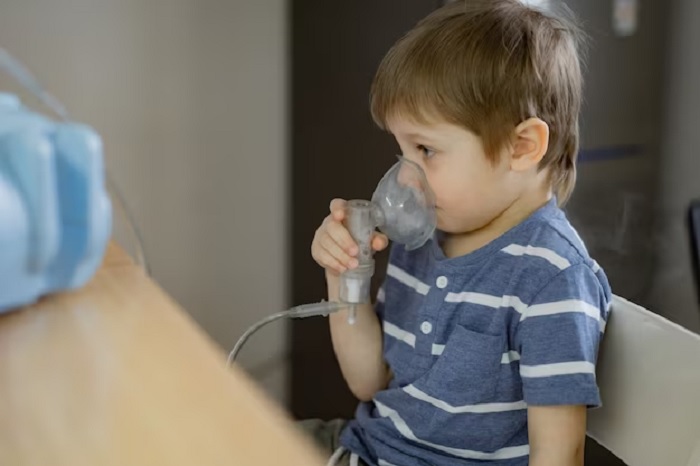Talking about common chronic disorders, both Asthma and Allergies rank on the list. A lot of their symptoms might be a little confusing for you to distinguish between them. Although they both might appear pretty similar, there are certain points, if known, can surely help you mark a difference between the two. This blog is all about how Asthma and Allergies are different in children and how they are interlinked. Give it a read because, as parents, you need to be aware of the early signs and symptoms so as to take an immediate medical step when required.
Difference between Asthma and Allergies in Children
Asthma in children
Asthma in children is quite the same as Asthma in adults. It is a lung disorder that leads to inflammation of the airways when exposed to some specific triggers, like dust mites, pollen, factory smoke, cold, or other respiratory infection. The symptoms can easily interfere with their everyday activities such as school, play, sleep, sports, etc. In some scenarios, unmanaged asthma symptoms can even lead to severe asthma attacks. Well, Advair HFA generic is a well known asthma drug that helps in relieving the symptoms effectively.
What are the signs and symptoms of Asthma in children?
Give the following common signs and symptoms of Asthma in kids a read so as to know the condition even better.
- Shortness of breath
- Wheezing
- Tightness or congestion in the chest
- Frequent cough that worsens during a viral infection, while exercising or sleeping, or when in the cold air
- Fatigue
- Whistling sound while breathing out
- Difficulty eating or grunting while eating (in infants)
- Irritability
- Trouble speaking
- Retractions
- Lack of energy during play
What are the risk factors of childhood asthma?
Although Asthma is pretty common, the development of this condition in the early stage of childhood makes your child prone to a lot of other discomforts or disorders. The following are certain risk factors that can lead to Asthma at a growing age: –
- Family history of allergies or Asthma
- Low birth weight
- Nasal allergies
- Frequent respiratory infections
- Exposure to tobacco smoke
- Residing near industrial areas
Allergies in children
Allergies are immune system disorders. They mainly happen when the body’s defense system (immune system) fights back harmless foreign particles called allergens, such as pet dander, pollen, animal fur, dust mites, some medicines, feathers, certain eatables, smell, etc. There are certain clinical treatments that are meant to suppress the allergic reactions faced by your child when exposed to allergens or triggers. This will help them cope with the condition better.
What are the signs and symptoms of allergies in children
The below-mentioned are some of the symptoms of allergic reactions in kids: –
- Allergic conjunctivitis:- Itchy, red, or watery eyes
- Asthma: – Breathing issues, coughing, wheezing
- Atopic dermatitis: – Dry, itchy, red skin
- Rhinitis: – Sneezing, stuffiness, nasal discharge, nasal itching, itching in the roof of the mouth or ears
- Urticaria: – Itchy welts or hives
- Food allergies: – Food allergies can be lethal. It is essential for you to know what all eatables your child is allergic to. You can even consult a nutritionist or your family doctor to get better guidance.
- Scratchy or sore throat
What are the risk factors of childhood allergies?
The risk factors associated with childhood allergies are somewhat similar to that of Asthma in children. The following are some of the factors that can raise the risk of your children getting affected with allergic reactions:-
- Exposure to airborne allergens, such as animal dander, pollen, mold, and dust mites
- Certain medicines, particularly penicillin or penicillin-based antibiotics
- Insect stings, such as from a wasp or bee
- Eatables like peanuts, wheat, tree nuts, shellfish, soy, milk, and eggs
Can allergies cause asthma attacks?
As mentioned above, allergy is considered one of the probable risk factors for Asthma in kids. Hence, if not treated at an early stage, allergies can lead to asthma attacks. You can purchase Advair HFA 230 21 generic and enjoy doorstep delivery and high-quality products.
How to know if your child has allergies or Asthma?
To know if your child has allergies or Asthma, first thing first, is to get a medical consultation done. Only an allergy and asthma specialist can provide an official diagnosis.
The doctor is most likely to conduct a clinical test and ask you questions regarding your child’s: –
- Medical history, any ongoing treatments, or medications.
- Severity, type, and frequency of allergy or asthma symptoms
- Family medical history
After knowing the details, the physician will start working on the treatment plan, which may include connecting you with an asthma or allergy specialist.
To conclude: –
Put a deep emphasis on the changes in health that your child is going through and educate yourself on the reflecting signs and symptoms. This will help you in taking the earliest possible step and help your child in quick relief.




